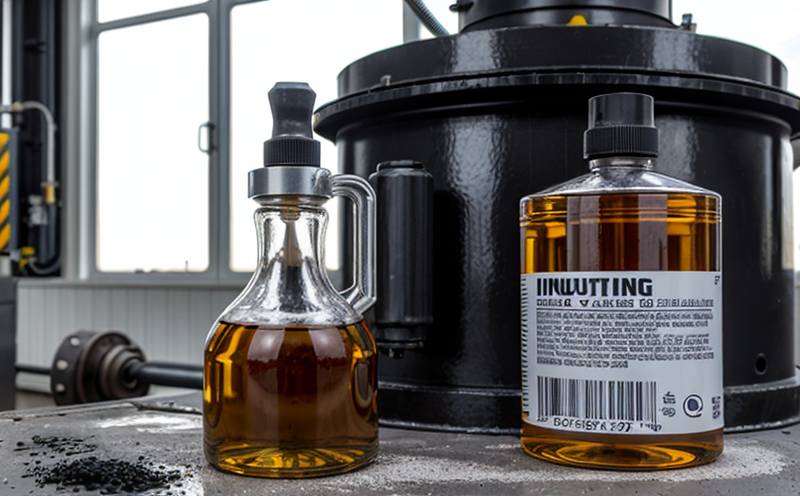CSA Z223 Fuel Oil Additive Testing
The CSA Z223 standard is a cornerstone in the assessment of fuel oil additives used within industrial environments. This service involves comprehensive testing to ensure that these additives meet stringent performance requirements, which are critical for maintaining operational efficiency and safety standards in various industries.
Industrial oil and additive testing under the CSA Z223 standard encompasses multiple parameters including viscosity, flash point, pour point, oxidation stability, and thermal and oxidative degradation tests. These assessments are crucial as they help to ensure that fuel oil additives enhance the performance of industrial fuel systems without compromising safety or causing environmental harm.
The process begins with careful selection and preparation of the fuel sample. Specimens are then subjected to a series of rigorous tests aimed at evaluating their ability to maintain effective operation under specified conditions. This includes testing for corrosivity, oxidation stability, and compatibility with other components in the system. The results from these evaluations provide critical insights into how well the additive will perform in real-world applications.
One of the key aspects of this service is its adherence to international standards such as ISO 8217:2017(E), which sets out specifications and test methods for marine fuel oils. By aligning our testing protocols with these globally recognized benchmarks, we ensure that all results are credible and universally accepted.
Our team of experts uses state-of-the-art equipment to conduct these tests, ensuring accuracy and precision throughout the entire process. Our facilities are equipped with advanced analytical tools capable of detecting even minute changes in fuel properties, thereby providing clients with reliable data they can trust.
The importance of this service cannot be overstated given the critical role that industrial fuel oils play in powering modern manufacturing processes. By ensuring compliance with CSA Z223 standards, we help businesses avoid potential operational disruptions and costly repairs while also contributing positively to environmental sustainability efforts.
In summary, our CSA Z223 Fuel Oil Additive Testing service offers comprehensive evaluation of fuel oil additives according to recognized industry norms. Through meticulous testing and analysis, we provide actionable insights that enable informed decision-making regarding the choice and application of these vital components in industrial settings.
Scope and Methodology
The scope of CSA Z223 Fuel Oil Additive Testing covers a wide range of parameters designed to assess the performance characteristics of fuel oil additives. This includes testing for viscosity, flash point, pour point, oxidation stability, thermal and oxidative degradation tests, among others.
- Viscosity: Measured at different temperatures using standard viscometers to ensure it remains within acceptable limits during various operating conditions.
- Flash Point: Determined through ASTM D93 or similar methods to assess the fire hazard associated with the fuel oil additive.
- Pour Point: Evaluated based on ISO 17302 to determine the lowest temperature at which the liquid can still flow freely.
For each parameter, detailed acceptance criteria are established according to CSA Z223 and other relevant international standards. These criteria ensure that only additives meeting rigorous quality benchmarks are approved for use in industrial fuel systems.
The testing methodology involves several steps starting with the collection of representative samples from different batches or lots of fuel oil additives. Once collected, these samples undergo initial screening to confirm their identity before proceeding to full-scale evaluation.
During actual testing, our technicians employ precise techniques and state-of-the-art instrumentation tailored specifically for measuring each specified parameter accurately. Data obtained from these tests is meticulously recorded and analyzed using statistical methods to identify trends or anomalies.
Achieving compliance with CSA Z223 requires not only accurate measurement but also consistent results across multiple replicates. Therefore, we adhere strictly to standardized procedures throughout the entire testing process.
Industry Applications
- Petrochemical Industry: Ensuring that additives enhance fuel efficiency and reduce emissions in refineries.
- Manufacturing: Supporting continuous production processes by maintaining optimal performance of industrial machinery reliant on fuel oil.
- Railroads: Guaranteeing safe operation of locomotives through reliable testing of fuel oil additives used in diesel engines.
- Military: Facilitating effective functioning of military vehicles and equipment powered by specialized fuels.
These applications highlight the versatility and importance of CSA Z223 Fuel Oil Additive Testing across various sectors. By adhering to strict testing protocols, we contribute towards improving overall operational efficiency while minimizing environmental impact.
In addition to these key industries, our service also supports smaller businesses involved in fuel distribution or maintenance activities where precise additive performance is essential for smooth operations.
Environmental and Sustainability Contributions
- Emission Reduction: By ensuring that fuel oil additives are effective at reducing harmful emissions, we play a part in environmental protection.
- Biodiversity Preservation: Minimizing the ecological footprint by optimizing fuel consumption leads to less pollution and better resource management.
- Resource Efficiency: Efficient use of fuel reduces dependency on non-renewable resources, promoting sustainable practices.
- Climate Change Mitigation: Contributions towards lowering greenhouse gas emissions contribute positively to global climate change mitigation efforts.
The significance of these contributions cannot be overstated in today's world where sustainability is a priority. Through our CSA Z223 Fuel Oil Additive Testing service, we aim not only to meet current regulatory requirements but also to set new benchmarks for environmentally responsible practices within the industrial sector.





